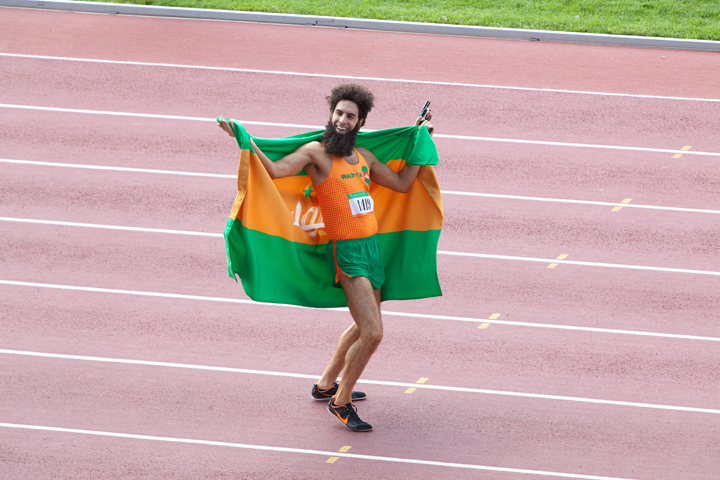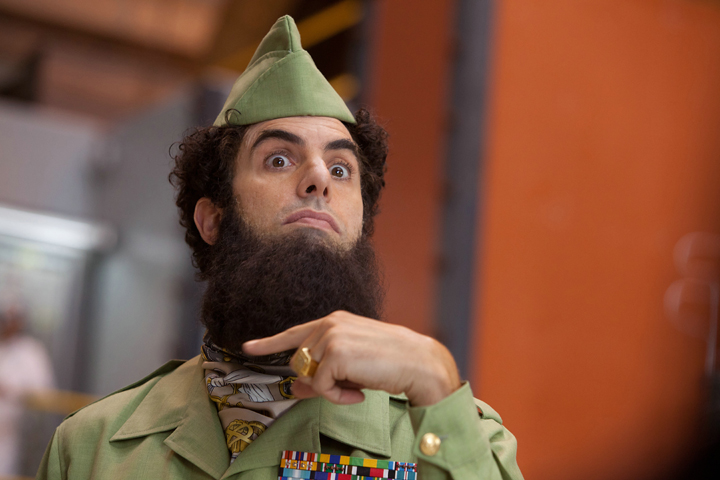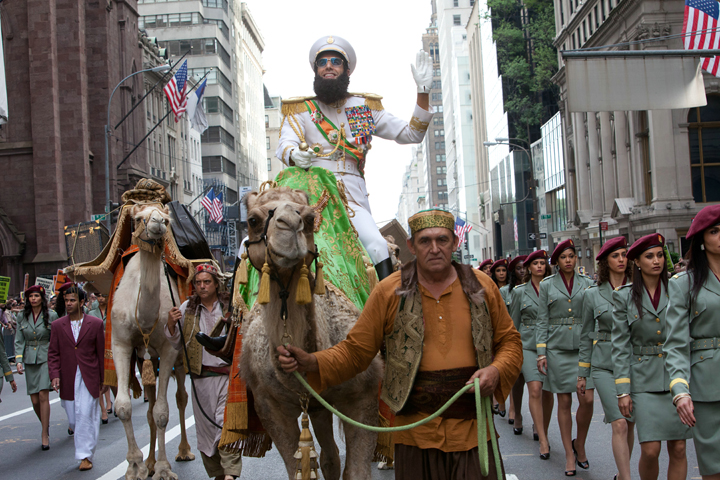
Wearing a lush, sans-moustache, Islamic fundamentalist-style beard, surrounded by a phalanx of gorgeous female bodyguards and living in a garish palace filled with bigger than life portraits of himself, Admiral General Aladeen’s official title is, “Admiral General Aladeen, Supreme Leader, Chief Ophthalmologist, Invincible, All Triumphant, Beloved Oppressor of the People of Wadiya and excellent swimmer, including butterfly.” Holding 118 PhD’s and a diploma in spray tanning from Qatar Community College, his accomplishments include changing three hundred words in the Wadiyan language to ”Aladeen,” and, when describing his country to a journalist, he stated, “My country has existed for over 7 million years, ever since the dinosaurs were wiped out by the Zionists,” and noted that he does “not have a nuclear weapons program, wink wink.” When he arrives in New York, he rides up Fifth Avenue on a camel followed by an entourage of a few dozen turquoise Lambourghinis.

The recently deceased Colonel Muammar Ghaddafi, who was also protected by a platoon of attractive female bodyguards, was known to pitch his giant, bulletproof, Bedouin tents on the the Champs Elysée, the Kremlin and in the Villa Doria Pamphili Park in Rome. Idi Amin Dada’s official title was “Lord of All the Beasts of the Earth and Fishes of the Seas and Conqueror of the British Empire in Africa in General and Uganda in Particular.” “President for Life” of Turkmenistan, Saparmurat Niyazov, aka Turkmenbashi, named cities, schools and a meteorite after himself. He also renamed the months of the year after himself and members of his family. Turkmenbashi ordered all libraries closed after deciding that his people only needed two books: the Koran and his autobiography. North Korea’s Kim Jong Il was said to be able to control the weather with his emotions and to have once made eleven hole-in-ones during a round of golf.

Forced to New York at the behest of the United Nations, Aladeen is kidnapped and switched with a double by his nefarious Uncle Tamir, who wants to profit from Wadiya’s oil wealth. As the double is set to sign a new democratic constitution for Wadiya, Aladeen escapes and is rescued by Zoe, the ultra-liberal manager of a feminist vegan food coop in Brooklyn, with whom he falls in love. Along the way, he finds Nuclear Nadal, the former head of his clandestine nuclear weapons program. Together, they hatch a scheme to get Aladeen, whose signature beard was shaven off by the kidnappers, to the hotel where he must foil the signing of the new constitution.
Throughout all this, there are numerous outrageous diversions that don’t necessarily bear discussing here, but what can be noted is that the bizarre antics of Aladeen in New York broach topics ranging from satiric commentary on knee-jerk liberalism to the value of dictatorship to gender issues, racism, and anti-Semitism, among others.
One of the stocks-in-trade of modern dictatorship is anti-Semitism/anti-Zionism, a theme that Baron Cohen also explored in Borat. Anti-Semitism in these films functions as a device that exposes Jew-hatred as the ideology of idiots. Both Borat and Aladeen are severe imbeciles, and their hatred and fear of Jews is a symptom of their stupidity. While Borat is meant to be seen as naïve and ignorant, Aladeen is malevolent and, although he is temporarily redeemed by the power of love, he is still a complete idiot. The message Baron Cohen wishes to convey to the audience is clear: anti-Semitism and racism are the domains of fools and thugs.
Although this message was understood by the Anti-Defamation League (ADL) when Borat first appeared in 2008, the organization nonetheless published a press release complaining that the film’s audience may not have been “sophisticated enough to get the joke, and that some may even find it reinforcing their bigotry.” The very idea that scenes like the ridiculous “running of the Jew,” or Borat’s fear of “shape-shifting” elderly Jews would be misunderstood as real doesn’t place the ADL’s assessment in a particularly realistic light. A portion of Baron Cohen’s audience may be unsophisticated, but it seems unlikely that they are that dumb. Worse yet, the ADL’s Abraham Foxman, who has apparently become the mafia don of anti-Semitism, demanded to sit down with Baron Cohen to “offer him a deal” in which the actor was requested to make advertisements for the ADL in order to assuage Foxman’s fears about his comedic method of satirizing prejudice. Cohen was nice enough to discuss the issue with Foxman, but the offer was one that he could refuse and, justifiably, he did.
Just as his unusual treatment of anti-Semitism has had a role to play in a number of his films, Baron Cohen also reserves an unusual function for Hebrew: as a linguistic beard for Arabic, or, technically, “Wadiyan.” Whenever Aladeen is perceived as speaking his own language, just as was done when Borat spoke “Kazakh,” he is actually speaking a kind of pidgin Hebrew, which Baron Cohen apparently imbibed from his Israeli-born mother and knows from his years in the Habonim-Dror youth movement and time spent as a volunteer on Kibbutz Rosh Hanikra.
The majority of the audience, whom, we assume, are not Hebrew speakers, are not in on the joke, the irony of which becomes evident as the Hebraic element exposes who, exactly, is behind this farce. With overly trilled r’s, deeply gutteral a’s, and lengthy affricative kh’s, Baron Cohen creates a linguistically Middle Eastern caricature that is comically offensive. Possibly a bizarre form of politically based, comic revenge, Baron Cohen serves up those perceived to be enemies of the Jews, namely Austrians (Bruno) and Arabs (Aladeen), as anti-Semitic buffoons.
What is evident is that Baron Cohen loves playing these imbecilic characters and performs them brilliantly. But what he appears to prefer more than anything is the awkward danger of live broadcast and is at his best when he is performing in character, riffing off the dupes of broadcast media. As a result, some of the best bits can be found in his promotional appearances just prior to the film’s release.
Whereas Baron Cohen’s three previous films, Ali G, Borat, and Bruno, all mocked the credulous dupes who interacted with the characters, here, the joke is on the audience, the members of which are trapped between the hammer of political and social satire and the anvil of outrageously vulgar humor. In a clever parody of Chaplin’s speech at the end of The Great Dictator, he cynically sows confusion by attacking democracy, exposing the many ways it has been exploited. But in a paraphrase of Churchill’s pronouncement, ”Democracy is the worst form of government, except for all those other forms . . .,” Aladeen proclaims the value of civil rights and democracy and calls for fair and free elections in his country. However, in a political nod to the rampant dissembling of real dictators, he returns to Wadiya to continue to, as he puts it, “lovingly oppress his people.”
That The Dictator was written before the advent of last year’s Arab Spring wasn’t an issue for the improvisational mastery of Baron Cohen. “I think that the Arab Spring is a passing fad,” he said (as Aladeen) in an interview with The Forward, “like the Atkins diet, or human rights. And you’ll find that pretty soon it will turn into the Crackdown Summer, Torture Fall and Execution Winter. But you know the Arab Spring could have been avoided. I told Mubarak a thousand times: “If you get Wi-Fi in your palace, put a fucking password on it. The people will start using it.”

